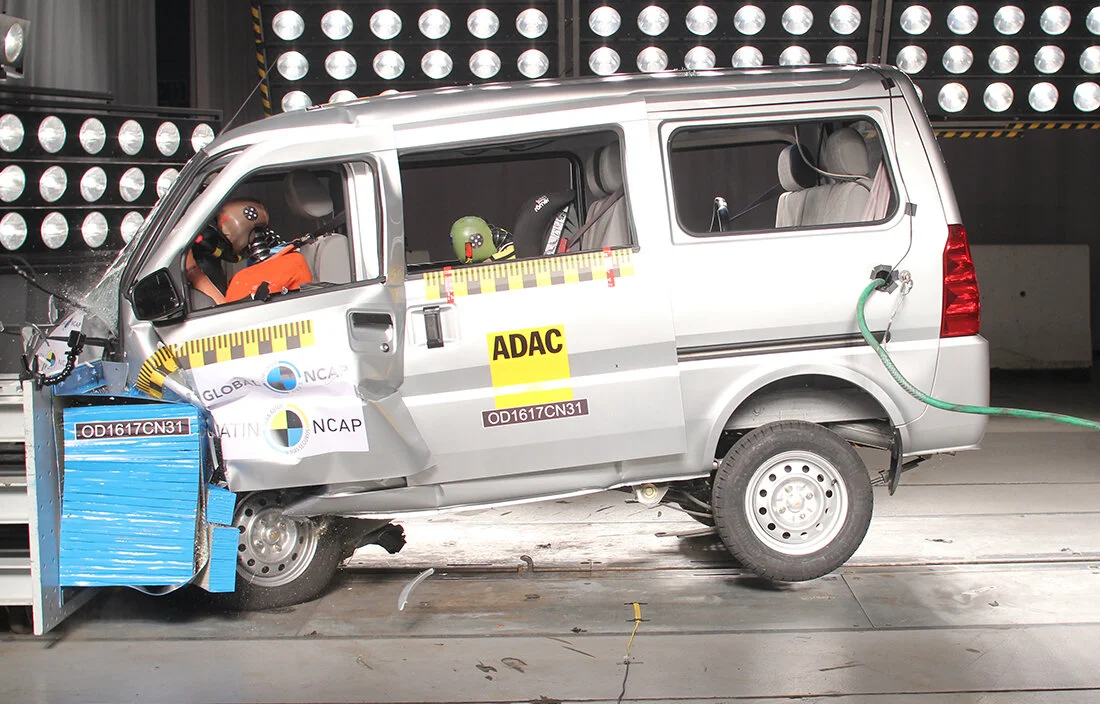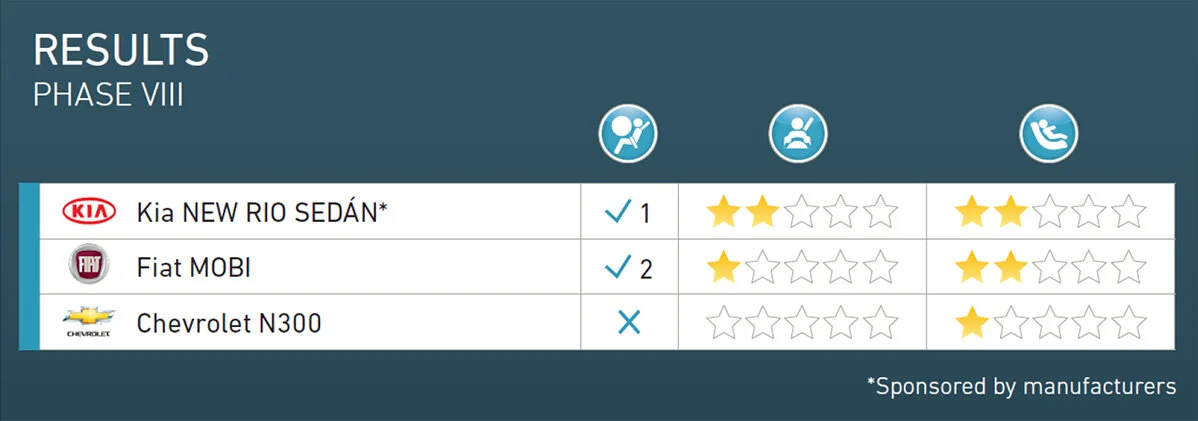Poor Results For Mobi And N300 While New Rio Sedan Improves
Latin NCAP’s fourth round of results for 2017 were released today with a disappointing zero stars result for the passengers version of the Chevrolet N300, one star for the A segment Fiat Mobi and two stars for the Kia New Rio Sedan.
The Chinese made minivan Chevrolet N300 for Passengers offered poor protection in the frontal crash test, achieving zero stars for Adult Occupant Protection and one star for Child Occupant Protection. The tested version is the most basic passengers’ version available in the market and came without airbags. This lack of airbags and an unstable structure contributes to the high probability of life threatening injuries recorded. Child Occupant Protection also scored badly as the vehicle had lap belts in two out of three of the second row seats, had no ISOFIX anchorages, and lacked of instructions for proper installation of Child Restraint Systems (CRS) as well as the recommended locations for them in the car. The side impact test was performed at the request of the manufacturer, showing marginal protection for the adult chest and good protection for the only CRS that could be installed in the car. Both doors in the crashed side opened during the impact.
The Brazilian made Fiat Mobi achieved one star for Adult Occupant Protection and two stars for Child Occupant Protection. The Mobi offered marginal protection for the adults’ chests in the frontal test and a stable structure, however, in the side impact the protection offered was poor. The structural performance of the Mobi in the side impact showed high penetration like in the recently published Chevrolet Onix, the lack of side airbags coupled with the poor structural performance explained the low score. The rear door opened during the side impact crash test exposing child occupants to potential risks. The lack of three point seatbelts in all seating positions as well as not having standard ISOFIX anchorages is a concern as it limits the proper installation of CRSs.
The Mexican made Kia New Rio Sedan achieved two stars for Adult Occupant Protection and two stars for Child Occupant Protection. The new model of the Rio Sedan offers standard a driver airbag. The structure was rated as stable in the frontal crash test. The structure showed a good performance in the side impact however, the lack of side airbags limited its capacity to offer better protection. The car does not offer Anti-Lock Braking System (ABS) and Electronic Stability Control (ESC) as standard, which surprises Latin NCAP as it is a new model in a competitive segment that in other markets offers as standard ESC, more airbags and more safety features. The lack of ISOFIX anchorages and lack of 3-point belts in all seating positions, limited installation instructions for the CRSs explain the two stars result for child protection.
Alejandro Furas, Secretary General of Latin NCAP said:
It is disappointing that after 7 years into the Decade of Action for Road Safety, not a single Latin America market has effective mandatory ESC and side impact protection regulations. Latin American governments are still more than 20 years behind Europe and US vehicle safety regulations. Some areas of the governments are willing to improve but others are not and are influenced by the industry lobby to delay or block regulations. That must stop. Latin NCAP has used consumer demand to pull the market for better safety way beyond governmental requirements; it is time for governments to have a more active cooperation with Latin NCAP and to make effective testing mandatory without making the star rating a restriction for the cars to be sold”.
Ricardo Morales Rubio, Board of Directors President of Latin NCAP said:
It is concerning that still in 2017 and near the end of the “Decade of Action for Road Safety”, our governments remain indifferent to the problems related to weak national legislations or lack of them, that should be aimed towards safer vehicles and to make consumers to be objectively informed of the safety levels and conditions of the cars for which they are making high investments. I call on our governments, manufacturers and society to continue working together in this direction and to adopt a strong position regarding the safety of vehicles that are sold in our countries.
The fifth round of Latin NCAP results will be released in September.
Chevrolet N300
Read the full crash test report / Watch the crash test video / Download crash test images
Fiat Mobi
Read the full crash test report / Watch the crash test video / Download crash test images
Kia New Rio Sedan
Read the full crash test report / Watch the crash test video / Download crash test images
About Latin NCAP
The New Car Assessment Programme for Latin America and the Caribbean (Latin NCAP) was launched in 2010 to develop a regional system of independent crashworthiness and safety rating across Latin America and Caribbean (LAC). Latin NCAP replicates similar consumer testing programmes developed over the last thirty years in North America, Europe, Asia and Australia, and which have proved to be very effective in improving the safety of motor vehicles. Since 2010 Latin NCAP has published the results of more than eighty cars in eight test phases.
Latin NCAP acknowledges the support received by the Global New Car Assessment Programme (Global NCAP), International Consumer Research and Testing (ICRT), FIA Foundation, the Inter-American Development Bank (IDB) and Bloomberg Philanthropies Global Road Safety Initiative.
Latin NCAP is an associate member of Global NCAP and supports the United Nations Decade of Action for Road Safety 2011-2020 and the Stop the Crash Partnership.
More info: www.latinncap.com






